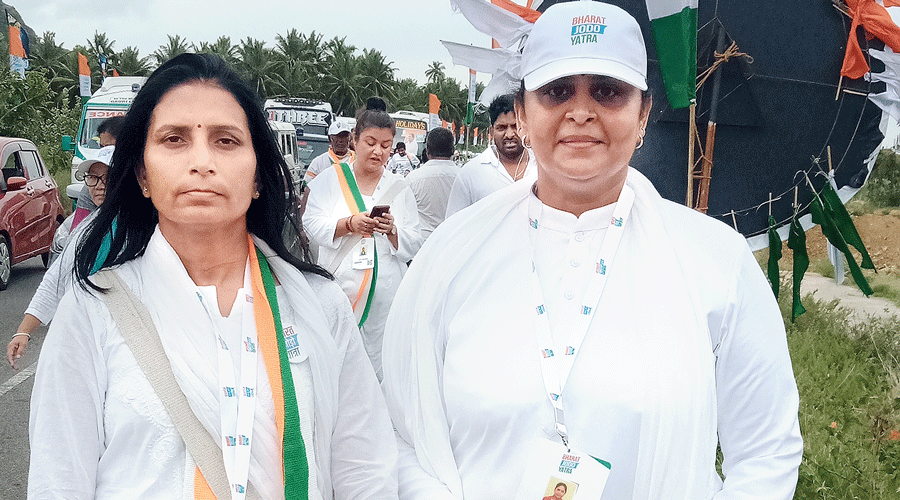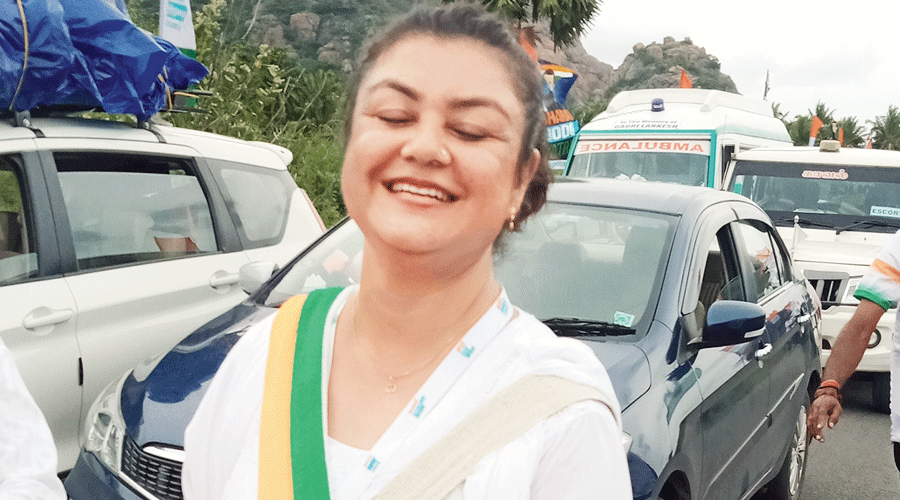Women participants of the Bharat Jodo Yatra that began on Thursday appear far more concerned about communal discrimination than gender inequality, insisting that only the majesty of the Constitution can give protection to the weaker sections of society, be it Dalits or tribals, minorities or women.
Many of the women Yatris feel the greatest concern today is the attack on the constitutional culture, which ensures equality of all kinds — gender, religious, racial or political. They argue that the specific task of women’s empowerment can be taken up in normal times when there are no dangers to democratic institutions, secularism and economic justice.
There are 35 women participants who will cover the entire 3,570km over the next 150 days, completely cut off from their families.
Sangeeta from Ratlam in Madhya Pradesh who has left behind two small children at home told The Telegraph that her overriding concern was communal hatred that has been injected into the veins of the society.
Asked why she decided to join the Yatra, she said: “Nafrat mitane ke liye (To wipe out hate). Nas-nas mein nafrat faila diya, har jagah ladai (They have injected hate into every vein of public life, you see conflict everywhere.”
Asked what she would achieve walking on the road, Sangeeta said: “Gandhi ke deewane hain (We are followers of Gandhi). Satyagraha se hi ladenge (We will fight only through satyagraha).”
A young woman who had nothing to do with politics a year ago said: “I was drawn into all this because of the unrest in the society caused by evil politics. I lived like a housewife but joined the Congress to resist the RSS-BJP’s regressive agenda. I became a communication coordinator. When this Yatra was announced, my husband encouraged me to join it. My mother-in-law supported the idea, promising to look after the children.”

Sangeeta (left) and Padmasree, among the Yatra participants. Sanjay K Jha
She said: “They told me to think about the children of this great nation. What will they face if the society is so badly poisoned? How are we enjoying our freedom today? Because the likes of Mohandas Karamchand Gandhi and Jawaharlal Nehru didn’t think about their own families. We fondly remember them even today. So why can’t we give 150 days of our lives to save this nation?”
Women’s participation in politics is insignificant even today despite Mahatma Gandhi encouraging their involvement in the freedom movement with the belief that India’s future depends on their boundless capacity for struggle and sacrifice. Rahul Gandhi has constantly advocated gender equality and promised to bring women forward in the party hierarchy.
To address concerns over gender inequality in politics, 33 per cent reservation for women in Parliament and the Assemblies was envisaged, but male dominance ensured it remains a far cry.
The number of women members in the Lok Sabha this time is the highest ever but few are known to be leaders in their own right and have been elected on the strength of their parties.
The result is that they hardly contribute to women’s empowerment and remain silent on even unspeakable crimes against women because of partisan considerations.
Padmasree, 47, from Vijayawada in Andhra Pradesh, the oldest of the women Yatris, shot back when asked if she would be able to complete the rigorous journey.
“Do I look weak? I am fit enough to walk long distances. Moreover, if Rahul Gandhi can willingly undertake this journey, why can’t I? Nobody forced me. I applied to be a full-time Yatri myself. They asked me whether I could endure the pain. I said yes because it is more about will than physical strength.”
Padmasree explained the need for the Yatra according to her own political consciousness.
“What’s the option before the Opposition parties if the media doesn’t show the true picture? It’s not that the Congress wasn’t speaking over the last eight years. We shouted and screamed about every problem; how democracy was being strangled. But the message didn’t reach the people. We can’t sit back and watch this spectacle. Our country belongs to all and it has to be run democratically.”
Equally determined and enthusiastic was Rubi Khan from Jaipur in Rajasthan, who also dwelt on citizens’ rights, equality guaranteed by the Constitution and the political freedom to oppose the government.
“All our democratic rights are being attacked by the Narendra Modi government,” she said, asserting that her resolve was to strengthen Rahul’s hands. “We will do whatever we can for our leader, no matter if we live or die. Walking 20-23km a day is nothing.”
Though most of the women Yatris fell far behind as Rahul walks fast and is physically fitter than many men of his age, there was no problem because hundreds of people walked with them today. It will be interesting to watch whether these women can sustain their interest and endure the ordeal of staying in containers mounted on trucks for 150 days.










